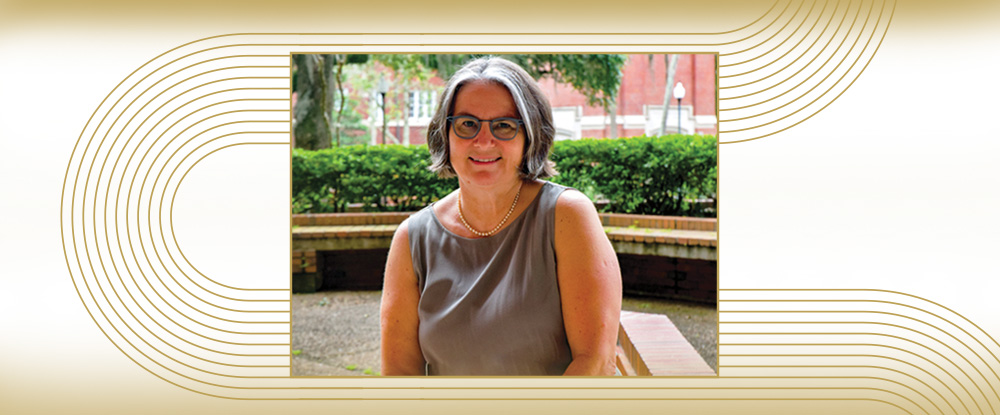The Center for the Humanities and the Public Sphere looks back on yet another dynamic and productive year despite the ongoing challenges of the pandemic. The humanities center engaged audiences in multiple formats, from webinars to in-person events outdoors. We tightened our collaboration with other humanities institutions across the United States, including the National Humanities Center, the University of California Humanities Research Institute, the Willson Center for Humanities and Arts at the University of Georgia, and the Jackman Humanities Institute at the University of Toronto.
Back at home, we engaged with faculty, students, and community members in virtual and live conversations about music. The second annual installment of our public engagement series, Conversations in the Neighborhood, organized in collaboration with the City of Gainesville, attracted over two-hundred audience members. The six events included workshops, panels, and conversations among scholars, students, practitioners, filmmakers, musicians, and members of the public. Dedicated to humanities’ approaches to music, the series posed questions about Native American identity, Latinx musical spaces, transnational music, archives, and popular culture of the Asian diaspora.
Close to 350 audience members attended the Speaker Series “Transforming Institutions,” which continued the multi-year series “Rethinking the Public Sphere.” Three speakers presented humanities perspectives on public institutions, from medicine and law to monuments and academia. Michele Bratcher Goodwin (University of California, Irvine), Paul M. Farber (Monument Lab), and Joy Connolly (American Council of Learned Societies) delivered public lectures and conducted workshops with faculty members. During the pandemic, these virtual interdisciplinary events brought together faculty members who had not yet met, particularly those across campus. For example, Law, Women’s Studies, and Biology professors gathered for the conversation with Goodwin; faculty members from Museum Studies, History, and Historical Preservation met with Farber; and humanities graduate coordinators, chairs, and administrators engaged with Connolly. The series was co sponsored by 15 units of a wide disciplinary ranging from the UF Levin College of Law to the One Health Center for Excellence.
CHPS awarded one grant to support a Library Enhancement Program in the Humanities, four grants for Speaker Series and Workshops in the Humanities, eight Rothman Faculty Summer Fellowships in the Humanities, five Programs in the Public Humanities, one Team-Teaching Award, and seven Publication Subventions. The Humanities Center awarded two Tedder Family and eight Rothman Doctoral Fellowships in the Humanities to graduate students, two National Humanities Center Virtual Podcasting Winter Institute for Ph.D. students, and one summer residency for a Ph.D. student at the National Humanities Center focused on using technology in humanities teaching.
In 2021-22, cosponsored and grant-supported events reached more than 2,000 audience members, while events organized and funded by Center staff reached over 800 attendees. These audience members hailed from around the globe, the country, and campus.
In the academic year 2022-23, the Speaker Series continues the multi-year topic: Rethinking the Public Sphere: Part IV, with a focus on Public Humanities. In September 2022, Brent Leggs (Executive Director, African American Cultural Heritage Action Fund) lectured on preserving African American cultural heritage at UF and engaged with community leaders at the Cotton Club Museum and Cultural Center. The following month, Dr. Barry Lam (Philosophy, University of California, Riverside) spoke on the theme of discretion in law, philosophy, and policy. In addition, he engaged in a conversation about podcasts with members of the faculty, communications, and other support services at UF. The series will conclude with a lecture by Nicholas Allen (Director, Wilsson Center, University of Georgia) on “Public Humanities as Enviornmental Humanities.” Together, these three talks consider the impact of the humanities in the public.
In fall 2022, the Center for the Humanities and the Public Sphere is welcoming two new staff members who will serve humanities faculty and graduate students in important ways. Dr. Anirban Gupta-Nigam comes to UF from the University of California Humanities Research Institute where he was a postdoctoral scholar conducting research and managing a Mellon-funded initiative on the vision of the liberal arts for the 21st century. At UF, Dr. Gupta-Nigam will focus especially on supporting faculty member with grant applications in the humanities.
Dr. Gupta-Nigam is joined by Dr. Sara Agnelli who has taken up the position of Assistant Director for Graduate Engagement. With a PhD in Classics, Dr. Agnelli is developing programs to support graduate students in expanding their perspectives on career diversity, including preparation for the academic job-market. Dr. Agnelli is preparing a public humanities graduate institute and public humanities internships for graduate students in summer 2023.
We invite graduate students and faculty members to avail themselves of our services.
We also continue our Humanities Engagement Scholars Program, which aims to engage undergraduate students across the humanities.
We hope to welcome you to our Synergies series during the academic year 2022-23 on zoom. The series showcases all the outstanding work that doctoral students and faculty have completed over the summer of 2022.
With gratitude to our supporters and collaborators,

Barbara Mennel
Rothman Chair and Director
Center for the Humanities and the Public Sphere
